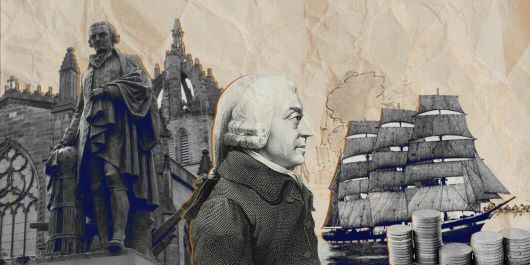Liberty Matters
Civilization, Persuasion and Propriety

The four exchanges triggered by Vernon Smith´s essay are different but interrelated responses. I will simply focus on some spontaneous reactions to the essays that celebrate Smith´s tercentenary.
Peter Onuf rightly refers to Adam Smith as a “history-minded comparativist whose understanding of contemporary market society was grounded in his empirical understanding of the contingent and ongoing development of state capacity, focused specifically on the problem of justice in Britain.” The rule of law combined with the British tradition of common law allows Smith to take experience as an evolutionary process. A great insight, underlines Peter, is that individuals are risk averse. And, as John Locke wrote in his Second Treatise, we value and defend “life, liberty and property”. Classical liberalism relies on this simple and very human assumption. It is also the basic foundation of self-interest. And regarding life - the most precious and first reason for self-interest - Vernon Smith delves into the way society has dealt with murder. The defense of life is Leviathan´s first civil responsibility. Yet the social and political importance of the development of murder leads Vernon Smith to argue that “victim compensation evolved into a tax as government became stronger”. This is a mark of civilization and as a final and suggestive connection Peter Onuf reminds us about the role of the United States. As a final reflection, how we have dealt with life and murder has shaped modernity.
Caroline Breashers engages with Smith's rhetoric, particularly with “the art of persuasion”. Persuasion is a key aspect that permeates all Smith’s legacy, through his Lectures on Rhetoric and Belles Lettres, Lectures on Jurisprudence, Theory of Moral Sentiments and finally Wealth of Nations. Its importance is pervasive and comprehensive, and I believe we can even talk about “sympathetic persuasion” (see Montes 2019). I do not need to persuade Caroline of the importance of persuasion. I fully agree with her. She concludes, the “desire of persuasion was a powerful human motivation for Smith”. But persuasion also involves risks: it can also become a strong and dangerous political impulse. Adam Smith and Vernon Smith are aware and alert towards the man of system who believes he knows what is best for all of us. Many enlightened politicians might attempt to move us over the chessboard of society forgetting that we can move on our own. Persuasion is a foundational concept behind exchange, division of labor and progress. But we need justice and the rule of law.
Brianne Wolf recovers Locke´s idea that property is “an extension of our right to our own person”. It is interesting to note that during the seventeenth century “property” and “propriety” were used interchangeably. They had the same meaning. Today property has a material sense, but “propriety” is still morally loaded. For example, the first part of TMS is precisely entitled “Of the Propriety of Action”. And we keep this linguistic tradition: when we talk about “proper behavior” or “to act with propriety” we refer to a moral conduct approved by society. In other words, the meaning and understanding of property has an ethical underpinning. It is even related to sympathy through the Greek concept of oikeiosis, something that Smith knew well.
David Hume - and a fortiori Smith - knew that “there is no conception of justice until there is property”. Justice is a social phenomenon, an artificial virtue that evolves. This evolution is social. And justice evolves as we socialize. In this sense, as Brianne reminds us, the role of sympathy is evident. Sympathy is the human principle that defines ethics. Yet the sympathetic process requires sentiments and deliberation. For that very same reason, in her brief but consistent “Affective Foundations of Property, Justice and Political Judgment” we feel and understand the value of ideas. If civil society rests upon justice and property, without sympathy there would be no society. But without justice and property there would be no society.
Inspired by Vernon Smith´s first essay, Peter Onuf takes us into progress and civilization. Caroline Breashers, into persuasion, and Brianne Wolf to the world of classical liberal ideas through John Locke´s concept of property. In a way, society and human nature emerge through the lens of Adam Smith´s sympathy and self-interest. What a great and consistent way to celebrate his 300th birthday.
References
Montes, L. (2019) “Adam Smith’s foundational idea of sympathetic persuasion”, Cambridge Journal of Economics, Vol. 43(1).
Copyright and Fair Use Statement
“Liberty Matters” is the copyright of Liberty Fund, Inc. This material is put on line to further the educational goals of Liberty Fund, Inc. These essays and responses may be quoted and otherwise used under “fair use” provisions for educational and academic purposes. To reprint these essays in course booklets requires the prior permission of Liberty Fund, Inc. Please contact oll@libertyfund.org if you have any questions.